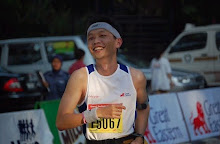When did you start running barefoot?
I started running barefoot in Sep-Oct 2010. At first, I walked in the park that I trained initially. After walking barefoot for a few weeks, then I jogged slowly and increased my mileage and speed.
Why do you run barefoot?
I started having this heel pain on my right foot around mid-2010. I ran Borneo International Marathon and SCKLM 2010 with this pain. It got worse, and I took a rest from racing. I thought the root cause was my running shoes. So I decided to stop wearing the cushioning shoes I had been wearing then. I was also guessing my running gait could be the root cause. I was hoping by running barefoot, it would improve my gait. Other reasons were to avoid more blackened toenails and to strengthen my leg muscles. So, I started trying out barefoot running.
Did barefoot running help to heal your heel injury?
I recovered from my heel injury fully after some time. But I cannot say it was solely because of barefoot running. I rested more and did a lot of other things like stretching, massage to improve my condition then. However, since I started running barefoot, I have not experienced the same heel pain anymore after my recovery.
What is your first impression of running barefoot?
Running barefoot requires both mental and physical conditioning. It may not be suitable for all runners, but I believe it could work fine for most people, if done slowly and properly. First experience of running barefoot was fear of the unknown and the painful sensation. The fear of the unknown was the fact that I didn't know where barefoot running would take me. And the painful sensation was due to direct contact of the soles with the rough asphalt/road surface. The sensation of stepping on small pebbles/stones, let's just say, is not what runners are looking for. Imagine, walking barefoot on the foot reflexology path in the park. That's why the mental part is needed. Barefoot runners need to prepare to experience some level of pain and risk of injury due to stepping on sharp objects. Otherwise on smoother surface, running barefoot would not cause much pain on the soles. Also, when running barefoot, there is more work for the Achilles tendon and calf muscles. I experienced sore Achilles tendon and sore calf muscles when I first started running barefoot.
How did you train in transition from shoes running to barefoot running?
As I said, I started to walk barefoot in the park for a few weeks first. Then, only I started to jog and increased my mileage slowly. Occasionally, I trained with lightweight shoes, and alternating with barefoot running. Mileage on barefoot was much less than with shoes initially. I increased the mileage on barefoot slowly. I also did some calf muscles strengthening exercises. I only started racing barefoot in June 2011 (about 9 months after I first started running barefoot), the event was Pacesetters 15km. I still train with shoes even now. For example, early morning in the park when it is still very dark and on the treadmill because it is the safety rule of the gym. I will also run with minimalist shoes on unfamiliar or rough route, if needed.
So you are not a full time barefoot runner now?
I run or train barefoot most of the the time, but not 100% of the time.
Will you be a full time barefoot runner in the future?
Maybe. If I run on shoes, it will be lightweight or minimalist shoes. It would be likely to protect my soles against harsh terrain or unknown surfaces or route.
What are the challenges you face as a barefoot runner?
Going to barefoot running, it was a re-learning process for me. I was willing to "un-learn" what I know before about running and start all over again. I had to give up my speed and pace (and I didn't even know if I would run with my race pace anymore). The biggest challenge I guess is being patient, persistent and persevere. On rough surface, I have to be more careful and endure some pain. At end of the run or race, there could be blisters on the soles. But our body is a wonderful thing, it will adapt and get stronger.
Of course, there will be risk to get injured because of sharp objects on the road. When you start running barefoot, you will be more alert and mindful on your every step. I would say, although barefoot runners look more vulnerable, but I think the risk of getting hurt because of sharp objects for shoes runners is not a lot lesser.
Other challenges include facing the stare and comments by some people. Some people will give insensitive remarks, but I will not let those remarks bother me.
What is your advice to barefoot-aspiring runners?
If you want to try out barefoot running, do it slowly. Start by walking barefoot on a route familiar to you. Increase mileage slowly and listen to your body. There are some reference materials on the Internet that can help too. Also, runners can get in touch with those who are more experienced in barefoot running to get more tips.
Barefoot running is not about "right" or "wrong" way of running. The more important point is to run with good form or gait to avoid/minimise running injury. It is perfectly fine to stay with shoes if that is working fine for you. The most important thing is, you'll find joy in running.
(If you have any question, please feel free to drop a line here.)
Cruel & Unfair Justice
6 months ago



